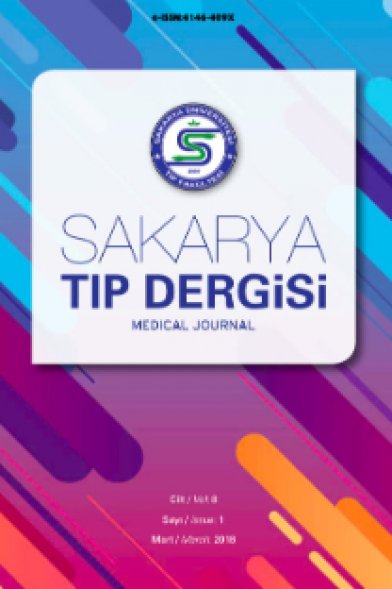Kronik Miyeloid Lösemide İmatinib Mesilat Tedavisi
Amaç: Merkezimizde takip edilen ve imatinib tedavisi alan kronik miyeloid lösemi (KML) hastalarında tedavinin etkinliğini retrospektif olarak değerlendirmek.Gereç ve Yöntem: Çalışmaya klinik ve laboratuvar verileri tam olan 85 kronik evre KML hastası dahil edildi. Bu hastalar, interferon tedavisi sonrası hematolojik veya sitogenetik yanıt gözlenmeyen veya interferon tedavisine karşı intolerans gelişmiş veya birinci basamak tedavi olarak imatinib tedavisi almıştır.Bulgular: Kırk sekiz (% 56,47) hasta erkek, 37 (% 43,53) hasta kadındı. Tanı sırasındaki hastaların yaşlarının ortancası yaş 52 idi (19-79). Ortalama takip süresi 45 (12-158) aydı. İzlemde kronik faz hastalarının 6'sı blastik ve hızlandırılmış faza ilerlemiştir. İmatinib tedavisinin üçüncü ayında, 77 (% 90,59) hasta tam hematolojik yanıt aldı ve 85 (% 100) hasta 18 ayda tam hematolojik yanıt aldı. Çalışmamızda, uygun metafazlı (≥ 20) 78 hastanın sitogenetik verileri, tanı konulduktan sonraki ilk 18 ay içinde değerlendirildi. 18 ayın sonunda 78 hastanın 68'inde (% 87.18) tam sitogenetik yanıt vardı. Sonuç: İmatinib, KML hastaları tarafından iyi tolere edilir ve alternatif bir tedavi yöntemidir.
Anahtar Kelimeler:
Kronik miyeloid lösemi, tedavi, imatinib mesilat
Imatinib Mesylate Treatment in Chronic Myeloid Leukemia
Objective: To evaluate retrospectively the efficacy of treatment in chronic myeloid leukemia (CML) patients followed up in our center and receiving imatinib treatment.Materials and Methods: Eighty-five chronic phase CML patients with adequate clinical and laboratory data were included in the study. These patients had not given hematological or cytogenetic responses after interferon treatment, or had intolerance to IFN treatment or received imatinib treatment as a first-line treatment in late and early chronic stage patients.Results: Forty-eight (56.5%) patients were male and 37 (43.5%) of them were female. The median age at diagnosis was 52 years (19-79). The mean follow-up period was 45 (12-158) months. In the follow-up, 6 of the chronic phase patients progressed to blastic and accelerated phase. In the third month of imatinib treatment, 77 (90.6%) patients had complete hematologic response and 85 (100%) patients had full hematologic response at 18 months. In our study, cytogenetic data of 78 patients with adequate metaphase (≥ 20) could be evaluated within the first 18 months after the diagnosis was made. At the end of 18 months, 68 (87.2%) of 78 patients had complete cytogenetic response. Conclusion: Imatinib is well tolerated by CML patients and is a superior treatment alternative to other therapies other than bone marrow transplantation in achieving hematological and cytogenetic response.
Keywords:
Chronic myeloid leukemia, imatinib, treatment,
___
- 1. Goldman JM. Chronic myeloid leukemia: a historical perspective. Semin Hematol 2010;47(4):302-11.
- 2. Pophali PA, Patnaik MM. The role of new tyrosine kinase inhibitors in chronic myeloid leukemia. Cancer J 2016;22(1):40-50.
- 3. Druker BJ, Tamura S, Buchdunger E, Ohno S, Segal GM, Fanning S, et al. Effects of a selective inhibitor of the Abl tyrosine kinase on the growth of Bcr-Abl positive cells. Nat Med 1996;2(5):561-6.
- 4. Druker BJ, Talpaz M, Resta DJ, Peng B, Buchdunger E, Ford JM, et al. Efficacy and safety of a specific inhibitor of the BCR-ABL tyrosine kinase in chronic myeloid leukemia. N Engl J Med 2001;344(14):1031-7.
- 5. O'Brien SG, Guilhot F, Larson RA, Gathmann I, Baccarani M, Cervantes F, et al. Imatinib compared with interferon and low-dose cytarabine for newly diagnosed chronic-phase chronic myeloid leukemia. N Engl J Med 2003;348(11):994-1004.
- 6. Hughes TP, Hochhaus A, Branford S, Müller MC, Kaeda JS, Foroni L, et al. Long-term prognostic significance of early molecular response to imatinib in newly diagnosed chronic myeloid leukemia: an analysis from the International Randomized Study of Interferon and STI571 (IRIS). Blood 2010;116(19):3758-65.
- 7. Goldman JM. Chronic myeloid leukemia- still a few questions. Exp Hematol 2004;32:2-10.
- 8. Deininger M, O Brien SG, Guilhot F. et al. International randomized study of interferon vs. STI571 (IRIS) 8 year follow up: sustained survival and low risk for progression of events in patients with newly diagnosed chronic myeloid leukemia in chronic phase (CML-CP) treated with imatinib.Blood 2009;114.
- 9. Cervantes F, Hernández-Boluda JC, Steegmann JL, Conde E, Alvarez–Larrán A, López-Jiménez J, et al. Imatinib mesylate therapy of chronic phase chronic myeloid leukemia resistant or intolerant to interferon: results and prognostic factors for response and progression–free survival in 150 patients. Hematologica 2003;88:1117-22.
- 10. Kantarjian HM, O’Brien S, Cortes J, Giles FJ, Rios MB, Shan J, et al. Imatinib mesylate therapy improves survival in patients with newly diagnosed Philadelphia chromosome-positive chronic myelogenous leukemia in the chronic phase. Cancer 2003;98:2636-42.
- 11. Goldman JM, Marin D, Olavarria E, Apperley JF. Clinical decisions for chronic myeloid leukemia in the imatinib era. Semin Hematol 2003;40:98-103.
- 12. Gratwohl A. The EBMT risk score. Bone Marrow Transplant 2012;47(6):749-756.
- 13. Saussele S, Lauseker M, Gratwohl A et al. German CML Study Group. Allogeneic hematopoietic stem cell transplantation (allo SCT) for chronic myeloid leukemia in the imatinib area:evalution of its impact within subgroup of the randomized German CML Study IV. Blood 2010;115(10):1880-1885.
- Başlangıç: 2011
- Yayıncı: Sakarya Üniversitesi
Sayıdaki Diğer Makaleler
Cem ÖZDE, Osman KAYAPİNAR, Hamdi AFŞİN
Nazan BEDİR, Elif KÖSE, Esra YAZICI, Hasan Çetin EKERBİÇER, Nurettin CENGİZ, Haldun Şükrü ERKAL
Toraks Travmalarında İleri Yaş Neleri Değiştirmektedir?
Tanı Karmaşasına Yol Açan İki Olgu: Rett Sendromu
Hilal AYDIN, İbrahim Hakan BUCAK, Haydar BAĞIŞ
Kronik Miyeloid Lösemide İmatinib Mesilat Tedavisi
Karotis Arter Hastalığı İçin Ümit Verici Bir Marker: Monositin High Density Lipoproteine Oranı (MHR)
Mitokondriyal Disfonksiyon ve Otizm
Tuba Demirci, Nuray Bilge, Özlem Özgül Abuç, Nuh Çağrı Karaavcı
